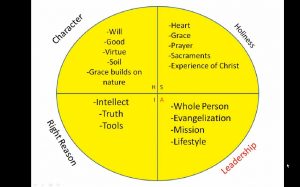All that is gold does not glitter,
Not all those who wander are lost;
The old that is strong does not wither,
Deep roots are not reached by the frost.
From the ashes a fire shall be woken,
A light from the shadows shall spring;
Renewed shall be blade that was broken,
The crownless again shall be king.
-J.R.R. Tolkien
Today’s world has a lot that glitters, and not a lot of obvious love for true gold in terms of what it values and lives by. To form our own values and principles for action in a way that reflect the Gospel means talking a personal responsibility for shaping ourselves and our consciences through an integral formation. An integral formation is a reflection of the classical idea of a liberal education, something the Church has always valued. Not ‘liberal’ in the modern, political sense of the word- but in the true sense that this formation or education liberates you- makes you ‘free’ to act from your own well-formed and rooted principles, instead of from the effects of the events around you. You are free to see the ‘unglittering gold’ and have roots deeper than the current frost can reach, as Tolkien speaks of.
 The Regnum Christi Member Handbook explains Integral formation in this way:
The Regnum Christi Member Handbook explains Integral formation in this way:
385 The primacy of grace in the apostolate does not exclude but rather presupposes the need for apt instruments in order to touch individual hearts —first the man, then the saint. Christ himself dedicated a good portion of his time and his apostolic life to preparing those who would be his instruments at the dawn of the Church.
386 The Church’s mission is arduous: to preach the Kingdom of Christ to every heart and the whole of society in the midst of complex circumstances and in sometimes hostile or indifferent environments. This requires men and women of character, well-formed and dedicated to Christ’s cause. Hence, every member of the Movement must strive to acquire an integral formation that will enable him to fulfill effectively and responsibly his evangelizing mission.
387 This integral formation is articulated in four dimensions: spiritual, apostolic, intellectual and human.
A. The purpose of spiritual formation is to achieve in each Regnum Christi member a deep and solid spiritual life, built on the bedrock of their knowledge, love, imitation and following of Christ. It is sustained by the theological virtues, frequent reception of the sacraments, prayer, devotion to the Blessed Virgin, loyalty to the Church and a spirit of sacrifice.
B. The purpose of apostolic formation is to form in each member of the Movement the heart of an apostle, full of zeal for the salvation of mankind, and to provide each one with knowledge, skills and resources in order to be effective in some work of evangelization and Christian charity.
C. The purpose of intellectual formation is a broad and deep understanding of Catholic doctrine in perfect harmony with the Magisterium of the Church and in tune with the sensibilities of each time in history. By systematically and organically studying spiritual and doctrinal topics, as well as those of our specific charism, we want our members to be better able to live their faith, better answer the questions brought up by their contact with the world, and to be able to preach the Gospel more effectively.
D. The purpose of human formation is to acquire a rich and balanced personality, full of human virtues and values, which will serve as a solid base for the supernatural action of grace. To this end, the Movement first of all invites us to address the formation of a right conscience, following natural law and the gospel teachings, guided by the Magisterium of the Church. Members must also get to know themselves and accept their reality so as to work realistically and serenely to improve themselves. They should also work to maintain the proper order between the area of their instincts, sentiments and emotions on the one hand, and their intellect and will on the other; achieve strength of character and a tenacious will; and develop social virtues such as discretion, politeness, simplicity and openness to others.
Along with formation, discernment is an important element of finding our true north.
What is Discernment?
(Excerpt from What Is Ignatian Spirituality? by David L. Fleming, SJ)
What should we do? We face large decisions in life: schooling, career, work, state of life, relationships, weighty commitments. Every day we face smaller decisions about our priorities and goals, how to spend our time, what to pay attention to and what to put off for another day. How do we make these choices? How do we weigh competing values? How do we discern the right path?
Classical Ignatian spirituality gives us a way to approach these questions. To follow Jesus we need to know how to make good decisions. St. Ignatius helps us approach this challenge in a practical way.
What Are We Looking For?
Ignatius would first have us be clear about the ends that we seek. Again we return to the Principle and Foundation for clarity about the values that should govern our choices. Everything in this world is presented to us “so that we can know God more easily and make a return of love more readily.” Thus, “our only desire and our one choice should be this: I want and I choose what better leads to God’s deepening life in me.” Our loving relationship with God is the goal and end of our life. All of our choices are means, steps toward reaching our goal. We enter marriage or choose a career or start a business or join an Ecclesial Movement as a way to deepen our relationship with God. All of these important choices are means, not ends in themselves. It is easy to lose sight of this and treat choices as the ends.
Our first choice or decision is simply to be a follower of Christ and to live the mission he gives you. Everything else—all our choices, big and small—follows from this.
The Analytical Approach
When we have our end clearly in sight, then we are able to tackle the complexities of decision making. One way is the analytical approach. In trying to choose between two goods, we might list pros and cons in two columns on a sheet of paper. If we are perplexed, we might also ask some friends what they think. Then we make a decision, offer our decision to God for his blessing, and pray for a consolation of peace as God’s gift to us.
Ignatius calls this type of decision making a “third-time” choice. “First-time” and “second-time” choices are decisions guided by our hearts, where confirmation comes not from the reasoning intellect but through a discernment of the meaning of the different movements of the emotions and feelings. This is Ignatius’s greatest gift to us about decision making. It may be called the gift of the reasoning heart.
Sometimes the Choice Is Clear
A first-time choice is a decision that is unmistakably clear. We know what is right. Ignatius cites two examples of first-time choice in the New Testament: the conversion of the apostle Paul, and the call of the tax collector Matthew. Neither man had any doubt about what God wanted of him (at least in these situations). First-time choices are not rare. We probably know people who never had any doubt about what they should do at major turning points in their lives. Some people are sure about their marriage spouse at a first meeting in this graced manner. Others are sure about their religious-life vocation or priestly vocation in a similar way. You may have had this experience yourself, at least in some circumstances.
 When the Choice Isn’t So Clear
When the Choice Isn’t So Clear
Sometimes our path is not entirely clear. We are presented with alternatives that all seem attractive to some degree, and we are not blessed with the gift of a clear certainty about what to do. In these cases, St. Ignatius says that we can discern the right choice by attending to the inner movements of our spirit. In particular, feelings of “consolation” and “desolation” will signal the correct course of action. St. Ignatius always carefully puts the word spiritual before consolation and desolation. For him spiritual consolation is our experience “when some interior movement in the soul is caused, through which the soul comes to be inflamed with love of its Creator and Lord.” Ignatius more simply describes consolation as every increase in hope, faith, and charity. Spiritual desolation is just the opposite. The words Ignatius uses to describe it include darkness of soul, disturbance, movement to things low and earthly, disquiet of different agitations and temptations.
Ignatius’s understanding of the importance of these feelings dates back to the very beginning of his conversion to a fervent Christian faith when he learned to pay close attention to his feelings. Discerning is not simply a matter of “feeling peaceful” about a proposed decision. The feelings of spiritual consolation and spiritual desolation must be carefully assessed. Complacency and smugness about a decision can masquerade as consolation. At times, desolation can be a timely sense of restlessness pointing us in a new direction.
St. Ignatius discusses how to work with his guidelines for discerning at some length in his “rules for discernment of spirits” at the end of the Spiritual Exercises.
Trusting God to Lead our Hearts
It seems surprising (and somewhat risky) to trust our feelings to the degree St Ignatius does, but this approach to discernment is entirely consistent with his vision of the Christian life. The Ignatian perspective tells us that we live in a world that is permeated by God, a world God uses to keep in touch with us. We seek to follow Jesus. We come to know who Jesus is, strive to make him the center of our lives and become his apostles. We make our decisions within the context of this relationship of love. It is a relationship of the heart. Our heart will tell us which decisions will bring us closer to Jesus and which will take us away from him.
Ignatian discernment, then, holds that our Christian choices are often beyond the merely rational or reasonable. “The heart has its reasons of which the mind knows nothing,” Pascal said. This is fine—as long as the heart has been schooled by Christ.
